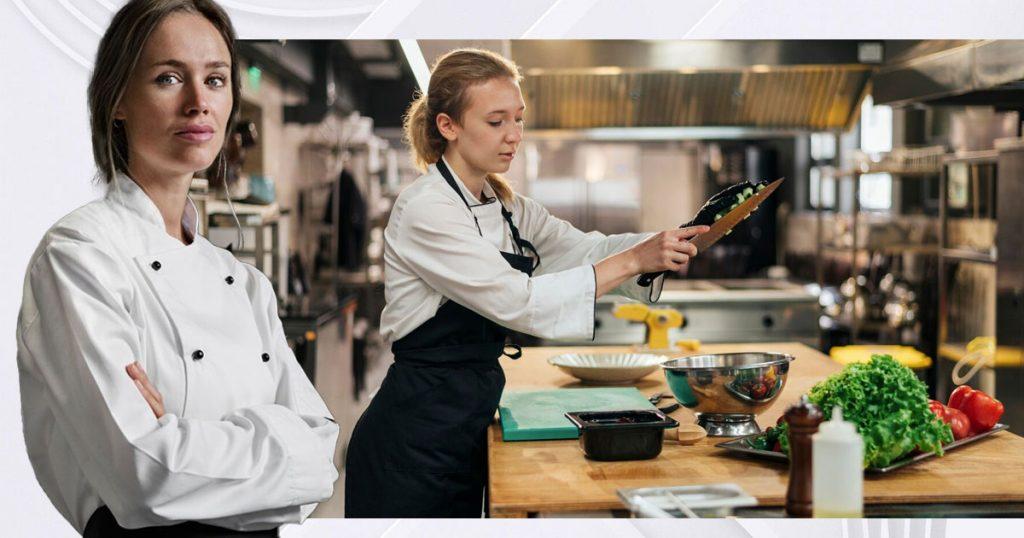Cooking is a lot like science, where carefully following a series of steps leads to a successful result. Just like scientific experiments, cooking requires precision and an understanding of each stage to create the perfect dish. In the kitchen, it’s not just about knowing how to cook; it’s about having a deep understanding of kitchen operations and how to manage them effectively. This knowledge is crucial for upholding the principles and standards of food preparation. Line cooks are key figures in this process.
What is a Line Cook?
A line cook is an essential team member in any kitchen, often referred to as a station chef. They are responsible for preparing and assembling dishes according to the restaurant’s menu. Each line cook usually oversees a particular station, like the grill, sauté, or prep area. For instance, at the grill station, a line cook might prepare burgers, steaks, or grilled vegetables, ensuring each item is cooked to perfection.
Line cooks are crucial to the kitchen because they directly influence the quality and consistency of the food. Their work ensures that dishes are prepared on time and meet the restaurant’s standards, which keeps customers satisfied and operations running smoothly.
Essential Skills for a Line Cook
- Having culinary expertise is crucial for line cooks, as they must be adept in various cooking techniques like frying and baking while also maintaining food safety standards. For example, knowing how to sear a steak perfectly without overcooking it is an essential skill.
- Attention to detail is vital for line cooks. They must precisely follow recipes to ensure that each dish has a consistent taste and presentation. This includes accurately measuring ingredients and artistically arranging food on plates.
- Line cooks rely heavily on time management skills to handle multiple orders simultaneously in a bustling kitchen. They need to prioritize tasks effectively, such as starting a roast early so it’s ready when needed.
- Organizational skills are important for keeping the workstation tidy and ingredients properly arranged. This organization helps line cooks work more efficiently and reduces the risk of cross-contamination.
- Communication is key in a kitchen setting. Line cooks must clearly communicate with chefs and other kitchen staff to synchronize cooking times and manage ingredient availability, ensuring all components of a meal are ready together.
- Adaptability is essential for line cooks, as they often face unexpected changes like a sudden influx of orders or missing ingredients. They must be quick to find substitutes or adjust cooking times accordingly.
- The ability to work well in a team is fundamental for line cooks. They frequently depend on their colleagues for sharing ingredients or lending a hand during busy periods.
- Lastly, having stamina and stress management skills is necessary for line cooks, considering the fast-paced and physically demanding nature of kitchen work. They need to endure long hours on their feet and remain composed during hectic shifts.
How to Become a Proficient Line Cook
If you’re interested in becoming a line cook, knowing what qualifications you need is key to succeeding in this career. Understanding these requirements helps you gain the right skills and stand out in the culinary field.
Steps and Qualifications to Become a Line Cook
Education
Although not mandatory, going to culinary school can be very helpful. These programs teach basics like using knives correctly, cooking methods, and planning menus. You might also learn about baking or international dishes, which gives you a wide range of knowledge to start with.
On-the-Job Training
Experience in the kitchen is extremely valuable. Start with beginner roles like dishwasher or prep cook. These jobs teach you how a kitchen operates and how to keep things clean and organized, which are essential skills for busier cooking roles.
Experience in Various Kitchen Roles
Try working in different parts of the kitchen, like the grill or sauté stations. For instance, at the grill, you learn about controlling heat and timing, while the sauté area requires quick cooking skills. Each position you try helps you become more flexible and knowledgeable about kitchen operations.
Core Skills Development
Develop important skills like managing your time and keeping things organized. This means efficiently handling multiple orders and ensuring your workspace is clean. Good communication with the team is also essential to ensuring all parts of a meal are ready together.
Networking and Mentorship
Getting to know experienced chefs and other cooks can help you find career opportunities and receive valuable advice. Mentors can offer tips on improving your cooking techniques and guide you through the culinary industry.
Certifications
Certifications, like food safety courses, are often required by employers to make sure health standards are met. These show that you are serious about your work and can be a great help when looking for jobs.
Continuous Learning
The culinary field constantly changes with new trends and techniques. Keep learning by attending workshops on new cooking styles or sustainable practices. Reading food magazines like “Bon Appétit” helps you stay updated with the latest in the culinary world.
Earnings and Benefits of Upskilling for Line Cooks
Becoming a line cook offers a promising start in the culinary world, with earnings that can grow as you gain experience and skills. Typically, line cooks earn between $25,000 and $35,000 annually, but working in upscale restaurants or bustling cities can increase your pay. Upskilling is a key strategy for advancing in this vibrant field. Gaining certifications, mastering new skills, or focusing on a particular cuisine can open doors to higher-paying jobs like head chef or sous chef.
Upskilling not only boosts your career but also enriches your job satisfaction as you embrace more creative freedom and a variety of tasks. You can set yourself up for a fulfilling and prosperous career in the culinary arts by investing in your abilities. Consider taking the next step toward enhancing your career, and you might find both personal and professional fulfillment in the kitchen.
